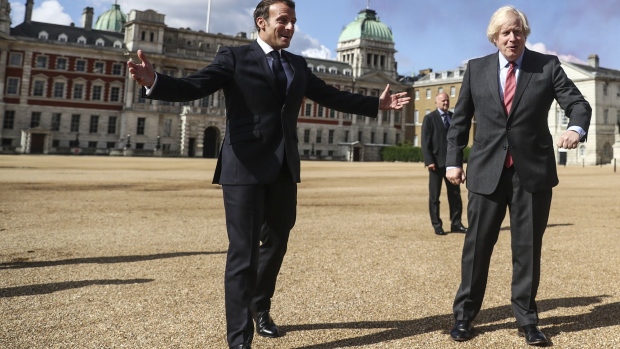Aug 11, 2020
Macron Is the Wild Card in the U.K.’s Attempt to Get an EU Deal
, Bloomberg News

(Bloomberg) -- It looks increasingly like Emmanuel Macron holds the key to whether the U.K. and European Union will get a trade deal.
Officials on both sides of the negotiations see the French president as the wild card who could scupper an agreement at the last minute if he thinks there’s more to gain by refusing to compromise.
With a French presidential election less than two years away and his ratings flagging amid an economy hit hard by the coronavirus, the officials say they fear Macron could think there are votes to be had in standing up to the British. Another negotiating round gets under way in Brussels next week, with both sides hoping to close in on an agreement by the start of October.
While U.K. and EU negotiators are now making slow headway toward a deal, Macron and the other leaders of the bloc’s 27 countries have scarcely paid attention to Brexit since talks on the two sides’ future relationship started in March. That will change after the summer when they will be asked to approve or reject any accord.
Fishing for Votes
What’s giving officials the jitters is that the biggest sticking point in the negotiations is something that has totemic significance among the working-class French voters that Macron needs to appeal to most: fishing. Equally, Prime Minister Boris Johnson’s successful push for Brexit included a promise to look after the interests of the U.K. fishing industry.
“The EU continue to insist on access to U.K. fishing waters in a way that is incompatible with our future status as an independent coastal state,” said a U.K. government official, asking not to be named in line with policy. The official declined to comment on Macron’s role in talks.
Without an agreement on fisheries there can be no overall trade deal, meaning the two sides would start trading on World Trade Organization terms with tariffs and quotas, and a breakdown in relations in areas ranging from police cooperation to environmental standards.
Four people familiar with the U.K.-EU negotiations, two on each side, said uncertainty over what Macron might do was more than a passing concern and that the issue has been discussed by British officials and informally between EU diplomats. One described it as the perfect storm of a French president eager to bolster his electoral support, a British prime minister who might settle for “no deal,” and an issue that’s highly symbolic for both nations.
Migrant Crossings
While Johnson and Macron get along personally -- the president is the only major EU leader to visit Johnson since his election victory in December -- the relationship between the U.K. and its closest overseas neighbor is never a simple one. Currently tensions are boiling up over migrants crossing the English Channel from France to England.
Within the trade talks, the fight is over the level of access French and other European vessels will get to the plentiful waters around the U.K. when Britain leaves the bloc’s Common Fisheries Policy at the end of this year.
Any agreement “cannot lead to the partial destruction of the EU fishing industry,” the bloc’s chief negotiator Michel Barnier said after the latest round of negotiations in London last month. Pointedly, he added that it was necessary to protect “the interests of all member states” by getting a “long-term solution” on fish.
The U.K. rejects anything resembling the status quo. Britain’s fishing communities voted overwhelmingly for Brexit in the 2016 referendum, blaming the EU for decimation of their industry. The British government sees control of its waters as part of regaining sovereignty and is pushing not for a “long-term solution” but for annual discussions with the EU over quotas based on the latest fish stock data that would give the U.K. a far bigger share.
Economic Realities
An Elysee official declined to comment other than to say Macron fully supported Barnier and his negotiating mandate.
Still, what’s giving officials some hope is that by the time he’s asked to intervene, Macron will be convinced of the benefits of an overall agreement for both sides. The EU has remained united on Brexit, and after the bloc last month reached a common position on the far more divisive issue of its post-pandemic recovery program, there’s little appetite to fall out over its relationship with the U.K.
The EU is betting that economic realities means Britain will want to do a deal too. British vessels catch far more fish than the U.K. consumes so relies on the EU market to sell to, which would be far more difficult without a trade deal.
“There is scope for a deal to be signed,” Anand Menon, director of the U.K. In a Changing Europe, a network of academics, told Bloomberg Radio. “But it won’t happen until the autumn, when political leaders on both sides of the Channel finally get properly involved and authorize the kind of concessions that both sides are going to have to make.”
©2020 Bloomberg L.P.


